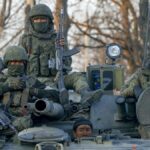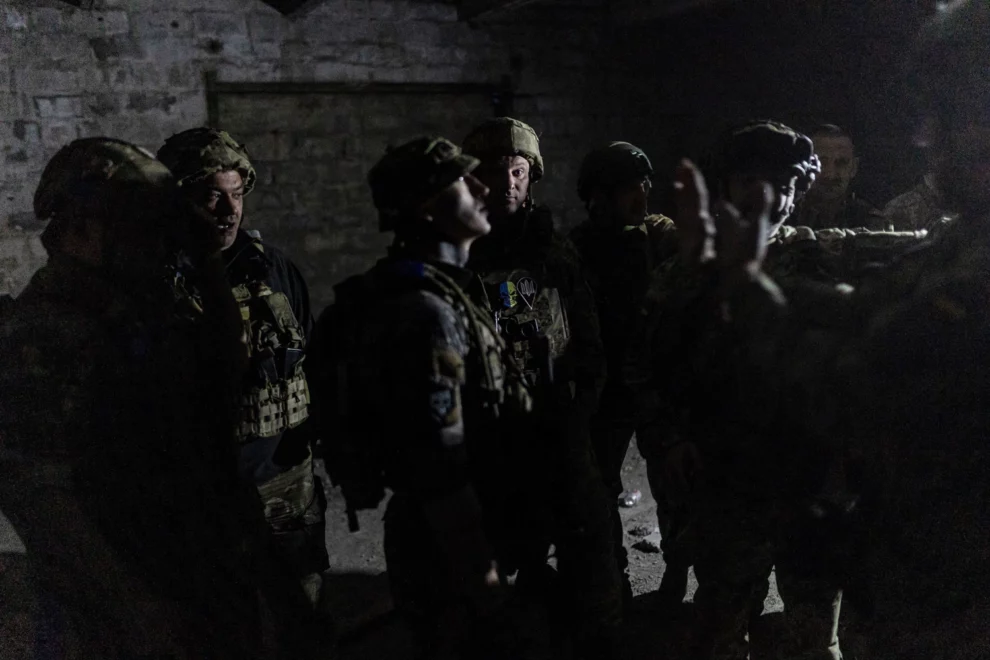KYIV, Ukraine — Ukraine urgently needs new soldiers, but some — left uneasy by brutal fighting and intensifying conscription efforts — are desperately trying to avoid being called up.
“When you see people in uniform, you panic. You start thinking someone will mobilize you now against your will,” a lawyer based in Kyiv told NBC News. He did not want his identity known, fearful, like a growing number of men across the country, of being drafted into the army if his name is made public just as Russia launches a wave of attacks to try to decisively seize the battlefield initiative.
The 25-year-old has no military experience and just became eligible to be conscripted after Ukraine lowered the age men can be drafted from 27 to 25 last month.
“I love my country,” he said in a phone interview earlier this month. “I donate to the Ukrainian army. But unfortunately, I am not very prepared to fight on the front lines because I don’t have the experience and I am probably not morally prepared to kill somebody, even if it’s someone Russian.”
Facing a third year of assaults from its vast neighbor, Ukraine is running out of men.
While volunteers lined up to fight at the beginning of the war, that fervor has waned and manpower shortages are now an issue that could seal Ukraine’s fate even if it can retain Western support.
So it has taken a series of steps that include passing a new mobilization law, increasing fines for draft dodging, and withholding consular services from Ukrainian men abroad who lack up-to-date military documents — measures that some soldiers on the front lines told NBC News they wholeheartedly support.
The mobilization law came into effect earlier this month in a bid to boost Ukraine’s depleted ranks, but it also has some men on edge.
“The mobilization itself is not even that scary, it’s more the process of being mobilized,” the Kyiv lawyer said. “You worry that someone will throw you into the bus one day, take you somewhere, turn off your phone, and you will be cut off from the world.”
His fear is exacerbated by videos on Ukrainian social media showing altercations between civilian men and recruitment officers on city streets and in public spaces across the country.
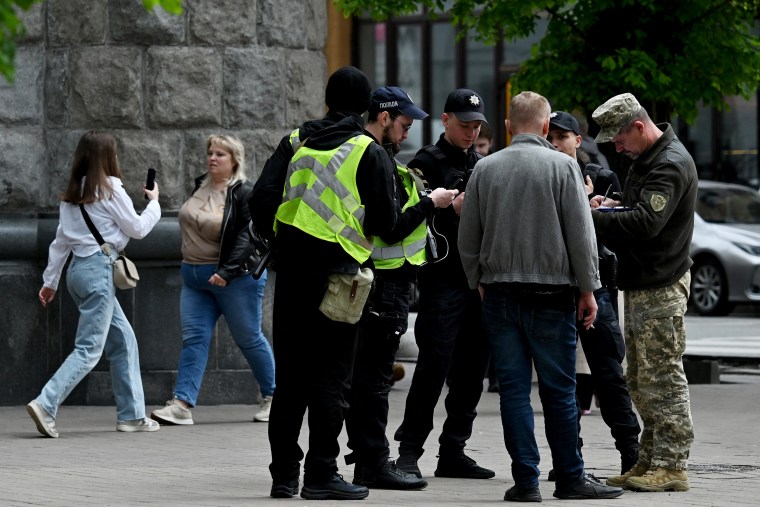
The exact circumstances in many videos are hard to verify, but NBC News geolocated one that spread widely across social media last week.
It shows a physical fight between recruitment officers and civilians in the country’s second-largest city, Kharkiv, near to which the Russians launched their new offensive. The territorial recruitment center in Kharkiv responded to the video in a statement on Facebook saying the officers were “aggressively provoked,” which was not shown in the video. One officer was injured, the statement said. Still, it added the officers should not have entered into an argument and physical confrontation.
NBC News reached out to Ukraine’s Ground Forces about the videos and the effect they are having on the public, but has not heard back. Ukraine’s Ground Forces commander, Gen. Oleksandr Pavlyuk, said in March that out-of-context videos and criticism of recruitment officers only provide fodder for Russian propaganda.
Still, they have also been feeding the fears of some draft-eligible men who are left apprehensive about venturing into public spaces and are trying to avoid any contact with authorities.
Others look for ways to illegally escape abroad — men ages 18 to 60 are currently barred from leaving the country.
Andriy Demchenko, a spokesman for Ukraine’s border service, said last month that 30 people have died since the beginning of the full-scale invasion trying to cross Ukraine’s western borders by traversing dangerous rivers, like the Tisza separating Romania and Ukraine, and mountains.
The efforts are often arranged by unscrupulous traffickers who are paid thousands of dollars for the crossings, the border service has said in other statements. Demchenko separately told NBC News that draft dodgers also try to cross illegally at regular checkpoints by using forged documents, trying to bribe border officers, or even hiding inside vehicles as stowaways.
For many, there is a “cognitive dissonance”: people want a victory for their country but in a way that means they or their loved ones are not conscripted, said Ukrainian political analyst Volodymyr Fesenko. “Some people try to flee abroad, some people go into hiding,” Fesenko said. “But the government has no choice,” he said, given “the situation on the front lines.”
Kyiv has been waiting for new U.S. military aid to arrive as Russia has been advancing in the east and launched its new offensive in the north, further stretching Ukraine’s already limited manpower.
Ukraine has been conducting a rolling mobilization to boost its ranks since Russia invaded in February 2022. But the new mobilization law that came into effect earlier this month will mean that all men of military age have to report to draft offices to verify their credentials within 60 days. The apparent goal is to give the Ukrainian government a fuller picture of who can be called up. Men will also have to carry their military registration documents with them at all times. Women are currently not being mobilized, but some have volunteered to join the fight.
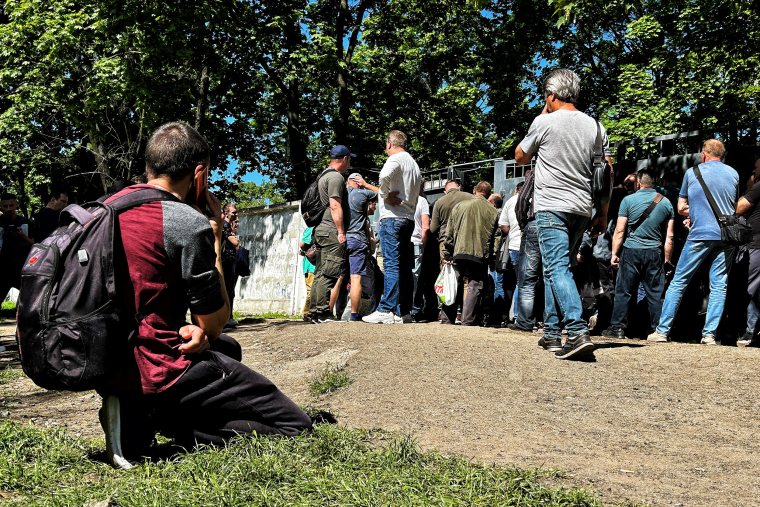
Those who don’t comply will face penalties, including restrictions on driving a car. The law underwent many amendments as lawmakers dragged their feet for months trying to pass an unpopular measure. Separately, President Volodymyr Zelenskyy signed a law earlier this month increasing fines for violating mobilization rules, while another now allows some prisoners to sign voluntary contracts with the army — an echo of a controversial practice employed by the Kremlin.
But it’s not just the draft-eligible men inside the country whom the Ukrainian government is trying to track down.
Anton, 39, was working in Germany as a truck driver before the war started, and came back to eastern Ukraine in December 2021 to see his family. After the invasion, he found himself in Russian-occupied territory, but managed to escape back into Europe. He is now in Ireland and says he doesn’t plan to come back to Ukraine, either now or when the war is over.
Anton, who did not want his last name shared so he can’t be traced by authorities, said he only feels responsible for the well-being of his family. “I don’t have anyone else to answer to,” he said.
A software developer from Kyiv told NBC News he left Ukraine for Portugal this spring before the new mobilization law was adopted. The 35-year-old did not want his identity revealed for fear of possible repercussions, and would not say whether he left Ukraine legally.
He said he left because he was worried about being mobilized, especially after hearing stories of other men being corralled by recruitment officers on the streets, which he said “doesn’t foster a desire to go defend the country.”
He said he knows from speaking with friends in the army that the need for more men is dire. But with no military experience, he said he was of better use to Ukraine by donating thousands of dollars monthly to the army and supporting the country’s economy with taxes he’s paying from abroad, rather than sitting in a trench. “If I see that I, as a person who works a lot with a high income, will be able to get a legal exemption and continue donating, I will immediately return to Ukraine,” he said.
The balance between running the country and mobilizing enough people for the front was also raised recently by the mayor of Dnipro, one of Ukraine’s biggest cities. Borys Filatov criticized the mobilization process, saying he was running out of municipal and public transport workers to ensure life can keep running beyond the front lines, including for the families of those who are serving.
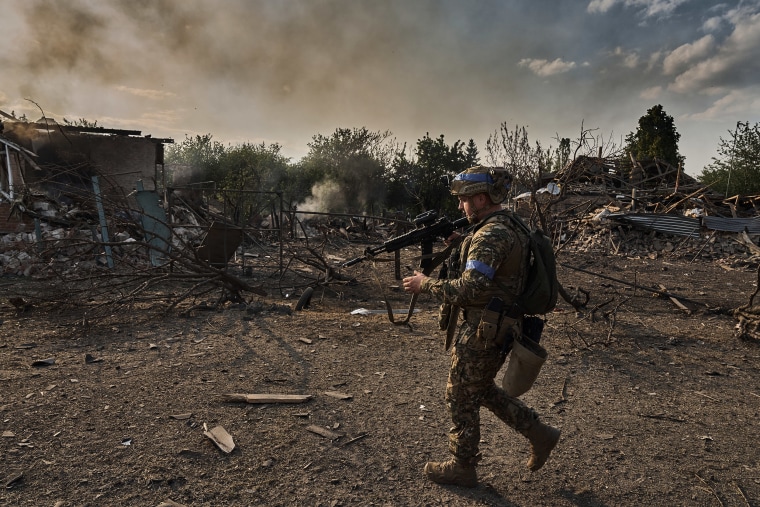
Ukraine’s defense ministry told NBC News that information about how many men currently serve in the army and how many it needs to mobilize constitutes a state secret. In December, Zelenskyy said the military had asked to call up 500,000 more men.
Ukraine faces an opponent that can call on far deeper reserves : Russia mobilized 300,000 men in addition to its regular armed forces in the fall of 2022, and has been conducting a rolling recruitment of contractors that has signed up more than 100,000 more men since the beginning of this year alone, according to its defense ministry.
These are sensitive topics for soldiers on the front lines, too.
“The war is ongoing, and the country must fight. People need to join the army. There is no other way,” said Oleksander, a private who joined as a volunteer at the beginning of the war and has been serving since.
For months, Ukrainian soldiers have complained to NBC News of exhaustion and uncertainty about when they could go home. The new mobilization law contains no provisions for demobilization, something that has also scared potential draftees.
“We are emotionally burned out,” said Oleksander, who did not want his last name revealed due to the sensitive nature of his service. “If the country is at war, then the whole country is at war.”
Oleksiy, an officer serving in military intelligence, said his comrades find it “sad and funny” that some Ukrainian men flee the fighting only to die by drowning while trying to escape abroad.
“What do we think of them?” asked Oleksiy, who did not want his last name revealed because he was not authorized to speak with the media and said he was expressing his personal opinion. “Someone has to do this job. If everyone runs away, what will happen?”
Oleksiy said he understands that not everyone can be a warrior, but that there is a need for noncombatant jobs in the army right now, like mechanics. “We need a lot of hands,” he said.
Source: NBC News






